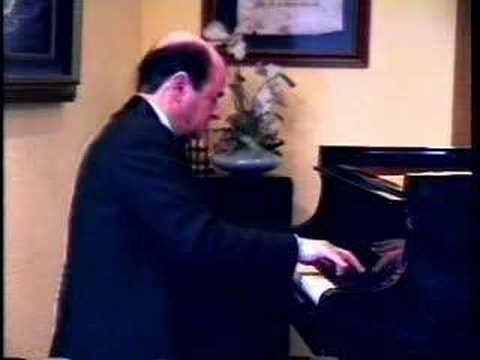
What does music mean to you personally?
Music is my life and livelihood. I am a concert pianist, a composer, an author, a teacher, a lecturer, a judge, a publication, a record company, the works…
Do you agree that music is all about fantasy?
Fantasy would surely be a part of it. Music is an art, and the noblest of them all. You can’t do art without imagination. Certainly you need the skill too, but skill without imagination does not lead to art.
If you were not a professional musician, would would you have been?
If I was not a professional musician I would have been nothing. Even though I can do and did many different things in my life, I can’t imagine doing something else as a profession.
The classical music audience is getting old, are you worried about your future?
Not worried, I’m also getting old…
What do you envision the role of classical music to be in the 21 century? Do you see that there is a transformation of this role?
Classical music is entertainment of the highest artistic values. Perhaps its role is to fill people’s hearts with heavenly beauty.
When I say that classical music is searching for new ways or that the classical music is getting a new face, what would come to your mind?
I am old fashioned; I do not feel the need for new ways or new face. I am happy with classical music the way it’s been all along and I’d be content to let it take its own natural course by itself.
Do you think that the classical musician today needs to be more creative? Whats the role of creativity in the musical process for you?
Classical music is plenty creative for me, whether as a performing pianist or a composer. When I perform classical music I am always creating and recreating; I never perform something twice the same way. The mere act of composing is already being creative.
Do you think we musicians can do something to attract young generation into the classical music concerts? How will you proceed?
Throughout my life I’ve been doing things to attract the young generation into classical music. I played all over the world thousands (no exaggeration) of concerts in schools during school hours in the mornings; I played hundreds of concerts for young people in the afternoons; I played tens of family concert; I played tens of concerts in universities and music schools. In all these concerts I always had verbal explanations and talked with the audience. Being somewhat humorous helped too.
Tell us about your creative process. Do you have your favourite piece (written by you) How did you start working on it?
My creative process varies. Sometimes I start with a melody in my head, sometimes I start with some improvisation on the piano, sometimes a certain rhythm is the driving force, and some other times a harmonic progression leads the way. E.g., when I composed my song cycle I made sure that I approached each song from a different composing angle; of course, the poems I was setting music to also had a lot of influence on the composition.
There were times that I got stuck in a composition and didn’t know where to go from a certain spot — something that didn’t let me sleep nights, but also got solved while in bed at night. In some of my Rags I actually added the opening part after composing the piece. Sometimes I even changed a piece after it was already published. Altogether, I don’t compose when I have inspiration, but when I decide to compose.
I don’t have a favorite piece; I like all my compositions equally.
Some of my pieces are based on songs; my Toccata is based on my own song that had its own life before I composed the Toccata.
We, Moving Classics TV, love the combination of classical music with different disciplines: music and painting, music and cinematography, music and digital art, music and poetry. What do you think about these combinations?
I’ve done plenty of these combinations through my life but I prefer pure music.
Can you give some advice for young people who want to discover classical music for themselves?
Nowadays it’s easy enough. The Internet has many sites where one can hear classical music as well as watch videos. That said, going to live performances is a very rewarding experience. Of course, if one plays any instrument, just sight reading through the wealth of material for that instrument is a great experience, let alone playing in ensembles with other players.
Now it is a common practice in the media to talk that the classical music is getting into the consumption business, do you agree? We are speaking about the supply and demand rules and how to sell your “product” in your case your compositions. How do you see it?
I don’t know. In my own case, I play my compositions in my concerts all over the world, whether piano solo or with other instruments or singers. I publish my compositions as well as record them and make the music and CD’s and DVD’s available to the public. I am very flattered and happy when someone like Anna Sutyagina wants to play and record a piece I composed.
Do you have expectations what regards your listeners, your audience?
I hope they’ll like my playing and my compositions. Hope they’ll buy my recordings and sheet music.
What projects are coming up? Do you experiment in your projects?
I don’t experiment in my projects. My immediate upcoming projects are not within composition, not even within actual piano playing and giving concerts. I am producing my book “The Art of Piano Fingering” in its Russian translation. The book was originally written in English (2012) and by now published also in German, Hebrew, and Chinese.